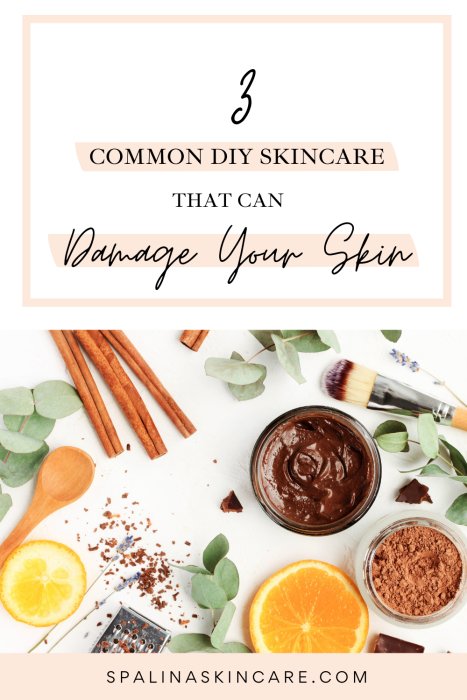The Truth About Homemade Beauty Products
DIY skincare has been around for centuries, but its rise in popularity is partly thanks to the internet and, of course, social media. Different social media platforms and blogs have made it possible for people to have access to a variety of information, especially in the beauty and skincare niche
As the need for beauty content creators to come up with topics to cover rises, DIY skincare became a go-to. It’s not surprising since DIY projects do make for perfect content; it incites curiosity and intrigues people to click and consume the content.
We all love a good DIY project, but sometimes it’s better to leave it to the experts. Especially if we’re talking about DIY skincare. We’ve all heard of some people who have ruined their skin by overdosing on baking soda and apple cider vinegar (or other ingredients). Read this before you go any further. Just because there are some DIY beauty remedies that work, doesn’t mean they’re all safe.
The Truth About Homemade Beauty Products
All-natural homemade beauty products have the risk of causing more harm than good. That’s because a lot of these homemade beauty recipes will contain harsh ingredients or other ingredients that can lead to more free radicals (highly reactive and unstable molecules that the body produces naturally and can damage DNA which can also lead to cancer and other diseases).
The Risks of DIY Skincare
With DIY skincare, you don’t always know what you’re putting into your body. When you make your own skincare products, you don’t always know if the ingredients you’re using are good for your skin. Some DIY recipes don’t really take into account your skin type and what products suit it best. There are a number of factors that can compromise the effectiveness of DIY skincare products such as the temperature (principal ingredients should be maintained at specific temperatures before active ingredients are added), the pH of the product, bacterial growth, quality control, and ingredients that aren’t really safe for topical use.
3 Common DIY Skincare That Can Damage Your Skin
1. Applying Lemon on the face to clear dark spots and brighten skin
There’s a good chance you’ve come across a DIY skincare recipe or hack that calls for lemon or lemon juice to be more specific. Because lemon juice contains vitamin C which is great for brightening the skin and acts as an antioxidant that fights off free radicals, it has become a common misconception that using pure, natural lemon juice on your face is more effective in addressing your dark spots or acne problems than buying products over the counter.
In a skincare product, a serum will typically have 5-15% ascorbic acid, 2-15% AHA, and 2-10% niacinamide whereas an average lemon juice only contain 0.04% ascorbic acid, 5% citric acid, and 0.0001% niacin*.
In skincare, the smaller the dose, the smaller the effect. On top of that, you’re also risking irritating and burning your skin when you try to DIY your skincare with lemon juice. So you really are better off purchasing skincare products from skincare brands that employ skincare professionals and/or chemists to create products that are effective and safe.
2. Toothpaste to get rid of acne
Oh, I’ve definitely heard of this one before and even know someone who actually believes this.
While nobody knows exactly how or where this trend/rumor started, there are some possible reasons as to why people may think that toothpaste is a good hack to get rid of acne. One of them being the fact that some ingredients found in toothpaste (baking soda, alcohol, and hydrogen peroxide) are known to be drying, but alcohol and your skin? Not exactly BFFs.
In fact, toothpaste can irritate the skin big time. And when you compromise your skin barrier like that, it will produce excess sebum to compensate for the dryness and eventually lead to clogged pores, breakouts, the works.
Doesn’t seem worth it now, does it? Trust me, it’s not.
3. Sugar and Ground Coffee as exfoliating scrubs
Just thinking about this one is like hearing nails on a chalkboard. It’s messy, painful, and just not worth it.
Sugar and ground coffee taken straight from your coffee machine are rough in texture and can cause micro-tears (invisible cuts) across your skin. Broken skin can result in dryness and even infection.
If you really want to exfoliate the dead skin cells away, there’s a proper way to do it. Do your skin a favor and just avoid DIY-ing this one.
Conclusion
Unless you have extensive knowledge of how the skin works and what ingredients to keep away from your skin, then it’s best to just leave it to the experts. If you feel like you’re saving yourself some bucks by DIY-ing your skincare, chances are you’re really not.
If you want to save money on skincare, consult an esthetician first. An esthetician can guide you on your skincare journey saving you the trouble of trial and error when it comes to choosing the right skincare products and routine for your skin type.
Not sure where to look? Spela Hernandez of Spalina Skincare is a licensed esthetician who has over 15 years of experience under her belt and has helped countless women achieve beautiful, glowing skin. She is also the woman behind Spalina Skincare and has created highly effective and luxurious holistic skincare products that your skin will love.
Book an online consultation here!
Like this post? Share it on Pinterest!
*Michelle, et al. “Don’t Use Lemon Juice on Your Skin.” Lab Muffin Beauty Science, 9 Jan. 2019, labmuffin.com/fact-check-feature-should-you-use-lemon-juice-on-your-skin.




